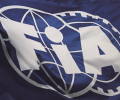Future regulations across multiple categories confirmed during the World Motor Sport Council
- 2026 Formula 1 Regulations restructured
- Regulations for game-changing entry-level touring car category set
- Cars from 1991-2000 now eligible for historic motor sport competitions
- Safeguarding Policy set out to protect all motor sport participants
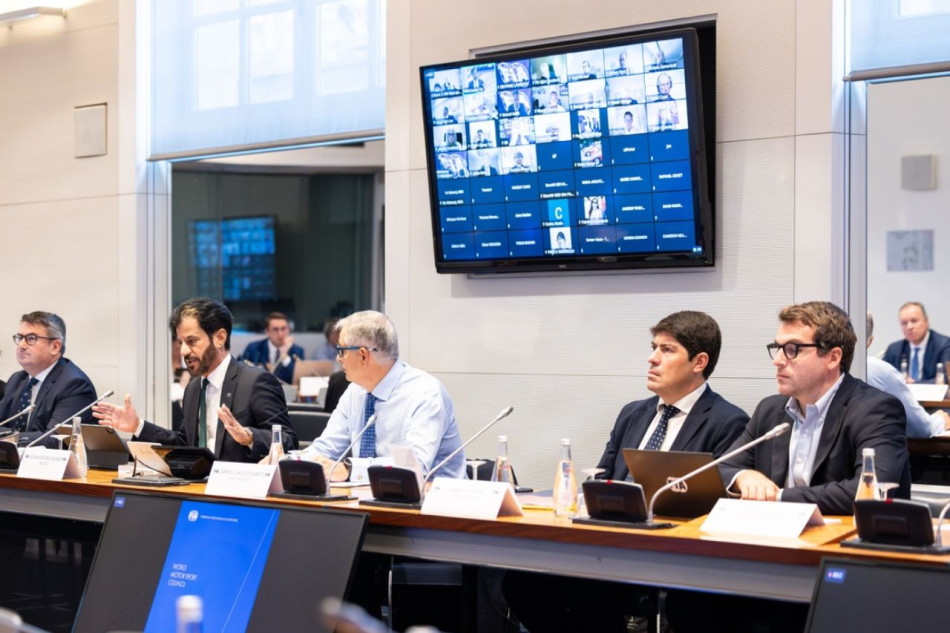
The FIA World Motor Sport Council convened today, 17 October, for its third meeting of 2024. The meeting was chaired by President Mohammed Ben Sulayem with World Council members joining in person at the FIA offices in Paris, and via video conference.
In his opening address, the FIA President highlighted recent significant new appointments to the federation, including the arrival of Alberto Villarreal as General Manager, and Alessandra Malhamé Senior HR Director, and reported on significant progress since the previous WMSC gathering which took place in June at the FIA Conference hosted by NAFKU in Samarkand.
Welcoming and thanking the Members for their efforts, the President addressed the council, saying:
“It has been a busy and productive few months since we last met, and as we head into the final months of 2024, I would like to thank you all for your ongoing support. Just four months after its announcement, the Affordable Cross Car design blueprints for the Level 2 category have now been delivered to the global network of 147 Member Clubs. And, next week will see the third edition of the Motorsport Games taking place in Valencia, as it brings nations and drivers together for the world’s biggest festival of motor sport. Later this year I look forward to sharing further details on the new FIA Karting Plan.
“The regulation changes for Formula 1 in 2026 will ensure the sport remains financially robust and has greater road relevance, alongside the introduction of upgraded safety features that do not compromise exciting racing.
"My thanks to Stefano Domenicali for our continued partnership as we progress the first joint strategy for the future of Formula 1.”
President Ben Sulayem also shared an update on the FIA’s current financial standing, noting:
“The implementation of a strong commercial strategy and a robust accounting process continues to be reflected in the reduction we see in our deficit, and I am proud to confirm that we are successfully meeting our objective of being a financially sustainable federation."
New structure for Formula 1 regulations and evolution of Financial Regulations from 2026
A significant update for the regulations set to govern the 2026 FIA Formula One World Championship and beyond was presented during the World Council. This includes a reorganisation of the way the regulations are laid out, which will be divided into thematic sections for clarity and consistency. The transition to the new structure will be concluded in the next few months.
The 2026 Technical Regulations (Section C), originally approved in June 2024, were subject to extensive enhancements to the aerodynamic regulations, which have been the subject of a strong collaboration between the FIA, FOM and the Formula 1 teams. This will see a higher performance from the cars, while maintaining management of the wake characteristics to promote close and exciting racing.
The 2026 Sporting Regulations (Section B) have undergone a significant update in order to simplify and modernise their structure. They have introduced measures to regulate the energy management of the Power Units as well as the management of the adjustable aerodynamics, which will involve the deployment of the “straight-line mode” (low drag) and the “cornering mode” (high downforce). In addition, there will be three pre-season tests of three days each for the 2026 season to account for the new power units that will be adopted.
The 2026 Financial Regulations (Section D) have built on the experience gained by the FIA, Formula 1 and the teams since the first introduction of Financial Regulations in 2021. Significant effort has been made to simplify the regulations by changes in the perimeter of exclusions and adjustment methodologies and to strengthen measures available to FIA to monitor compliance to the Financial Regulations. The overall level of the cost cap has remained – in effect – equivalent to the current levels, while the changes to the actual number reflect the changes to exclusion and adjustment perimeter and the effect of cumulative inflation.
Further elements will be submitted to the World Council for approval in the coming months to complete the regulation package for 2026, while refinements to the already approved sections will continue with the collaboration between the FIA, FOM and the Formula 1 teams.
Paving the way for Touring Car Lite
Following the announcement of an all-new entry-level touring car category – Touring Car Lite – at the FIA Conference in June, the World Council today approved the regulations that will enable cars that already comply with FIA Rally4, Rally5, and Rally5 Kit Regulations to undergo minor adaptations and have their homologations extended to circuit racing.
This will allow competitors to, at relatively low cost, run cars that can compete in both rally and circuit racing disciplines, capitalising on the hugely successful entry level rally categories to boost the base of the touring car pyramid and create a globally consistent pathway to international competition.
Regulations for two categories of TCL have been approved today: the TCL5 class will be for the most accessible, entry-level cars with a power-to-weight ratio of around 6.0kg/bhp, while TCL4 cars will offer a step up in terms of performance, with approximately 5.1kg/bhp. Both will be fitted with sequential gearboxes.
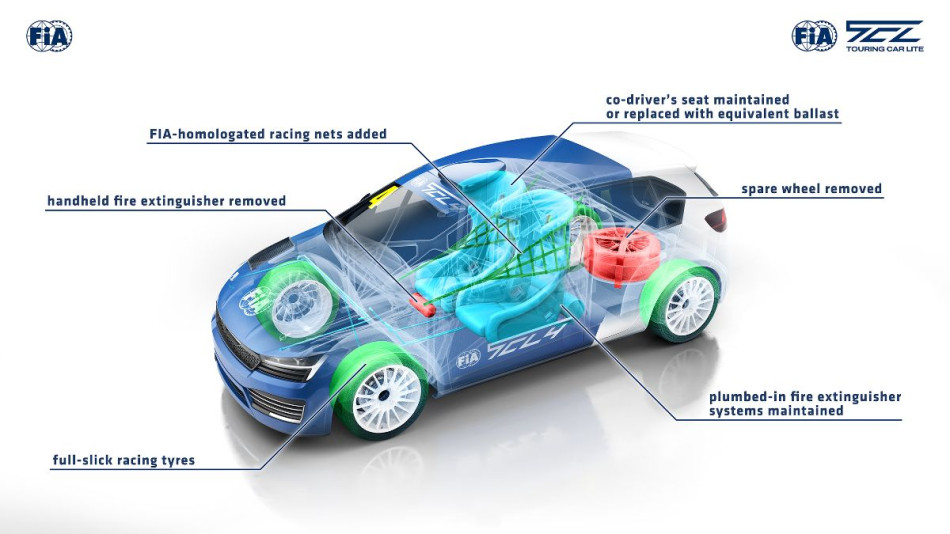
A landmark moment for historic motor sport
Today’s World Council meeting saw the approval of a rare and significant update to the regulations governing the eligibility of historic cars to take part in motor sport competitions.
These changes to Appendix K of the International Sporting Code mean that, from 2025, racing cars built between the years 1991 and 2000 will be able to carry the Historic Technical Passports that allow them to compete in FIA championships and international motor sport events.
This update will bring many of the world’s most iconic race and rally cars back into the crucible of motor sport, allowing fans and enthusiasts to enjoy the sights and sounds of what was a remarkable decade of technological advancement.
In circuit racing, legendary Formula 1 racers from the spectacular turbo era, which previously were only approved for demonstration, are now moving to the race categorisation, together with F1 cars from the period 1987-2000.
The Formula 1 3.5 litre machines that followed the ban of turbo engines will be returning to competition, as well as the much-loved Formula 3000 category. In sportscar racing, this new period of eligibility means that historic events will now reflect the rise of the iconic Le Mans Prototypes and GT with cars like the Mercedes-Benz CLK GTR, Porsche 911 GT1, McLaren F1 GTR, or Ferrari F40 LM, Jaguar XJ220, and Chrysler Viper.
For touring car fans, the Super Touring period now falls into eligibility as well, bringing fan-favourites from the likes of Audi, Opel, Renault, Alfa Romeo and Volvo back to do battle once again.
The change for historic rally sees a wide range of new cars become eligible, including some of the most iconic categories in recent memory.
The classic Group A period of the mid 90's included cars like the Group A Subaru Impreza, synonymous with the late Colin McRae. The Mitsubishi Lancer and Ford Escort Cosworth were also hugely successful in this era, together with cars from Toyota and Lancia.
As the 90's decade came to an end, the World Rally Car format was introduced in 1997. These turbo 4WD cars were at the cutting edge of transmission technology, braking and performance. The Toyota Corolla WRC, Subaru Impreza WRC, Ford Focus WRC and the Peugeot 206 WRC remain some of the most popular and alluring rally cars to this day.
The move to year 2000 opens up an unprecedented variety of new rally cars from the humble Nissan Micra through to the iconic legendary cars of the sport above.
The FIA will make further announcements and conduct workshops in early 2025 to help the owners of the newly-eligible historic cars apply for their Historic Technical Passports and get the cars racing again.
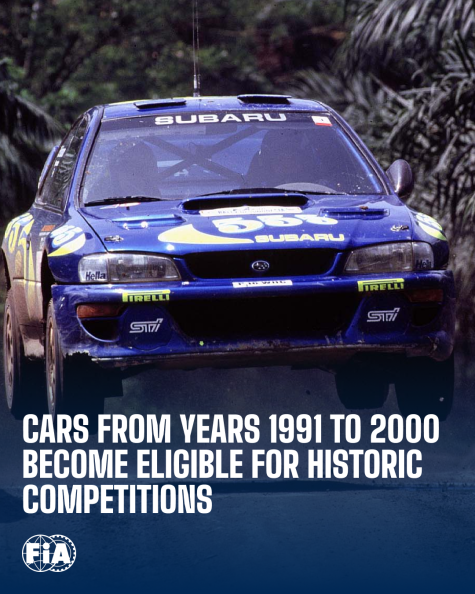
Driven by Respect – Setting new standards in safeguarding
Following a collaborative drafting process across the FIA and in collaboration with ASNs and other global sporting bodies, the new FIA Safeguarding Policy and Regulations were unanimously approved by the World Council.
In the world of sport, the safety and well-being of all participants is of paramount importance, and as the world governing body of motor sport, the FIA recognises the fundamental right of every individual to compete, work, and thrive in an environment free from abuse and harassment.
These clear guidelines, procedures, and support mechanisms will create an environment where individuals are empowered to speak up, seek assistance, and act against any instances of abuse, harassment, or exploitation.
The Safeguarding Policy is founded on the following key principles already enshrined in the FIA regulations:
- Welfare of the individual
- Equality and inclusion
- Accountability
- Confidentiality
Regulatory updates
FIA Formula One World Championship
Minor changes for 2024 and 2025 Sporting and Technical regulations were approved by the World Council, including the removal of the point awarded for setting the fastest lap and the increase in requirement for fielding a young driver during free practice from once per season to two times per season.
FIA World Rally Championship
In the WRC sporting regulations, the option of a Remote Service Zone (RSZ) has been introduced as an alternative to the Remote Tyre Fitting Zone (TFZ), providing WRC organisers with greater flexibility in planning the itinerary, helping to reduce road section distances or reach special stages that would otherwise be out of range.
It also allows competitors and teams to carry out repairs or adjustments when there is no return to the rally base at midday, hence helping to keep cars in the competition. Three team members per crew are permitted to transport designated tools and spare parts to the RSZ and perform work alongside the crew within the zone.
FIA World Endurance Championship
Sporting and Technical regulations for the 2025 FIA World Endurance Championship season have been approved.
In order to enhance the fan experience, leader lights will be replaced with multicolour LED display panels fitted on each side of the cars, offering wide viewing angles and capable of displaying a range of information.
The homologation period for the Hypercar class cars has been extended by two years and will lapse until the end of the 2029 season.
The lifespan of the LMP2 cars has also been extended and their homologation will lapse until the end of 2027. Following the suspension of the LMP2 class from full-time FIA WEC competition at the beginning of 2024, these cars continue to have presence in the European Le Mans Series, Asian Le Mans Series and IMSA SportsCar Championship, remaining an important part of the endurance racing ecosystem.
Any driver having driven less than 45 minutes in total during a race will not score FIA WEC championship points - this is a reduction from the previous limit of 60 minutes. Additionally, each Hypercar manufacturer must nominate two cars to score points in the World Championship.
ABB FIA Formula E World Championship
World Council Members have validated the Sporting and Technical Regulations for the upcoming 2024-2025, with updates mostly aimed at allowing the use of four-wheel drive on the GEN3 Evo car in specific scenarios such as qualifying duels, race start and Attack Mode.
It includes also an update on Manufacturer’s eligibility for the newly created FIA World Championship title for Manufacturers as well as the introduction of a tyre parc fermé overnight on events. Lastly, updates and adjustments to the Financial Regulations for Teams and Manufacturers have also been made.
The 2024/25 calendar was approved as follows:

FIA World Rallycross Championship
The 2025 FIA World Rallycross Championship Calendar is approved as follows:

FIA World Rally-Raid Championship
The World Council approved updates to the W2RC sporting regulations, and the criteria defining the start order of Leg 1 have been amended to discourage tactics during the Prologue and increase interest in the start order selection process. Adjustments have also been made to the start order of subsequent stages to better account for the Challenger and SSV competitions.
A new set of rules has been implemented to better control assistance between competing crews, in particular to ensure that race service trucks complete the entire selective section if they need to assist others, without shortening large parts of the itinerary.
With regard to championship points, the World Council approved an update to allocate two points to all registered competitors classified beyond 15th position, and one point to all registered competitors who are not classified in a Rally-Raid event (four points and two points respectively for Marathon Rally-Raids). This aims to provide a small incentive to registered competitors, ease tie-breaks, and facilitate the monitoring of participation. This proposal has also been applied to the World and Baja Cups.
FIA Karting
The World Council approved the 2025 karting calendar, which includes the addition of two new FIA competitions: an FIA Karting Academy Trophy for Senior drivers at three rounds and an FIA World Cup for the OK-NJ category (one single round):
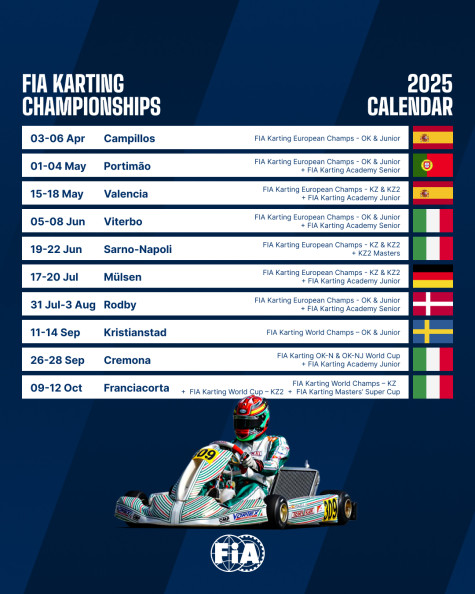
Cross-Country Rally
In the Cross-Country Rally sporting regulations, the term “co-driver” has been replaced with “navigator” to better reflect the special skills required in the discipline, which slightly differ from those of rally co-drivers.
A set of proposals for the FIA World and Regional Baja Cup, developed after extensive consultation with competitors and organisers over the past months, has been approved with the aim of reducing season costs, providing more opportunities for all competitor profiles, and rationalising the calendars to increase participation. This includes combined calendars—with regional cup events now forming part of the World Cup—a maximum number of events from which competitors can choose to score points at entry, and the introduction of Junior (under 26) and Master (over 50) Cups.
Regional Rally
In the Regional Rally sporting regulations, the process for accepting national and regional cars in Regional Rally Championship events has been streamlined with the aim of providing clarity and ensuring that the performance level of FIA-homologated cars remains the standard.
A framework defining the concept of chicanes and the implementation criteria for virtual chicanes and slow zones has been introduced as a result of extensive work by the Rally Commission, with the view of adopting a practice successfully tested at the 2023 ERC Rally di Roma and rolled out since this summer in the WRC.
The World Motor Sport Council has approved the appointment of Hankook as the tyre supplier for the 2025-2026 FIA ERC Junior Championship.
Upcoming World Motor Sport Council Meetings:
Date | Venue |
11 December | Within the framework of the FIA General Assemblies week |
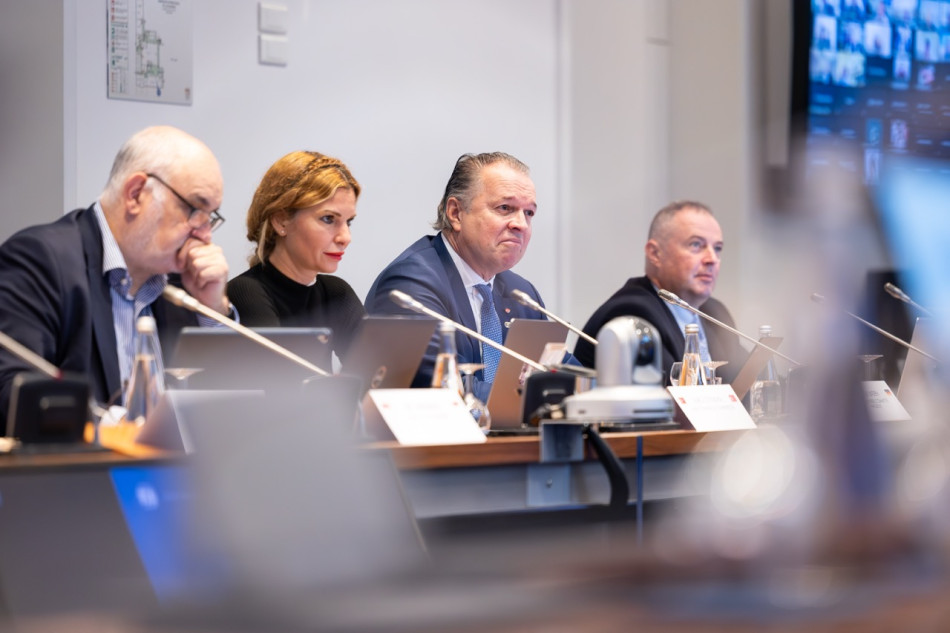

 Facebook
Facebook Twitter
Twitter

